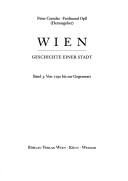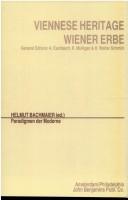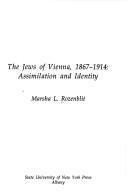| Listing 1 - 10 of 22 | << page >> |
Sort by
|

ISBN: 3205992687 9783205992684 Year: 2006 Publisher: Vienna, Austria; Cologne, Germany : Böhlau Verlag,
Abstract | Keywords | Export | Availability | Bookmark
 Loading...
Loading...Choose an application
- Reference Manager
- EndNote
- RefWorks (Direct export to RefWorks)
This volume is the last and final part of a trilogy on a detailed history of Vienna. It covers the period from 1790 until the present times. For the decisive forces as well as the inhabitants of the city this era of the urban development of Vienna has to be counted among the most dramatic periods characterised by a great number of real breaks in history. Napoleonic occupation, the revolution of 1848, the constitutional as well as the economic and social changes from the middle of the 19th century onwards, the final end of the position as "Reichshaupt- und Residenzstadt" (capital and residential city of the Austro-Hungarian empire) at the end of World War I, the challenging and complicated inter-war-period, Vienna's fate under Nazi-domination, the air raid of World War II and its end as well as the years after 1945 so far never described in such a comprehensive manner - all these events establish the chronological screen for the description and mark decisive incidents being treated here. In a chronological framework six authors arrange a pattern of Vienna's political, social, economic and cultural history. An innovative step is marked by the attempt to give a description of the ever so decisive periods like the "Fin-de-Siècle" and the complicated years after 1918 considering the intellectual mainstream and including men of letters and their works as contemporary witnesses and references. Vienna's development after 1945 - regarding the political history until the elections of 2001, the social and economic history in some aspects even furthermore - has not been treated in such a profound manner so far. This volume - as its predecessors - imparts the latest state of research to a wide public, supported by many illustrations and a large bibliography as well as a useful register of place names and persons. Der dritte und abschließende Band einer auf drei Bände konzipierten Stadtgeschichte beschäftigt sich mit dem Zeitraum von 1790 bis zur Gegenwart. Diese Epoche der Wiener Stadtentwicklung zählt für die gestaltenden Kräfte in der Stadt wie auch für deren Bewohnerinnen und Bewohner zweifellos zu den besonders dramatischen, von vielen regelrechten Brüchen charakterisierten Zeitspannen. Napoleonische Besetzung, die Revolution des Jahres 1848, die konstitutionellen wie die wirtschaftlichen und sozialen Veränderungen ab der Mitte des 19. Jahrhunderts, das Ende der Stellung als Reichshaupt- und Residenzstadt mit dem Ende des Ersten Weltkrieges, die schwierige Epoche der Zwischenkriegszeit, die Geschicke Wiens unter der NS-Herrschaft, die Bombenjahre des Zweiten Weltkrieges und dessen Ende wie natürlich auch die bislang noch niemals derart umfassend behandelten Jahre seit 1945 - all das bildet die Zeitfolie, vor der die Darstellung abläuft, markiert einschneidende Geschehnisse, denen sie sich widmet. Sechs Autorinnen und Autoren vermitteln in einem vom Grundsatz her chronologischen Aufbau ein Bild, das verwoben in die (politische) Ereignisgeschichte der sozialen, wirtschaftlichen und kulturellen Entwicklung breiten Raum einräumt. Dabei stellt der Versuch, die für Wien so prägenden Epochen des "Fin-de-Siècle" und dann der so ungemein schwierigen Jahre nach 1918 unter starker Berücksichtigung geistesgeschichtlicher Strömungen und mehrfach mittels des Einbaus literarischer Zeitzeugen bzw. -zeugnisse zu behandeln, einen methodisch durchaus innovativen Weg dar. Die Jahre der Wiener Entwicklung nach 1945, im Hinblick auf die politische Geschichte bis zur Gemeinderats- und Landtagswahl von 2001, bezüglich der sozialen und wirtschaftlichen Entwicklung in Ansätzen sogar noch darüber hinaus, haben bislang noch niemals in derart eingehender Form Darstellung gefunden. Wie schon bei den 2001 und 2003 vorgelegten Bänden 1 und 2 dieses dreibändigen Werkes gilt auch für den letzten Band das Bemühen, eine auch breiteren Kreisen zugängliche Darstellung zu bieten. Dies wird durch eine reiche Bebilderung, eine umfangreiche Bibliographie sowie ein Register der Orts- und Personennamen unterstützt.
Vienna (Austria) --- Wien (Austria) --- Vi︠e︡denʹ (Austria) --- Vedenʹ (Austria) --- Vena (Austria) --- Wiedëń (Austria) --- Bécs (Austria) --- Vindobona (Austria) --- Videnʹ (Austria) --- Vienne (Austria) --- Viena (Austria) --- Wienn (Austria) --- Dunaj (Austria) --- Wean (Austria) --- Wenen (Austria) --- Wina (Austria) --- Wene (Austria) --- Uigenna (Austria) --- فيينا (Austria) --- Fīyinnā (Austria) --- Vyana (Austria) --- Вена (Austria) --- Горад Вена (Austria) --- Виена (Austria) --- Beč (Austria) --- Fienna (Austria) --- Viin (Austria) --- Βιέννη (Austria) --- Вена ош (Austria) --- Vena osh (Austria) --- Vieno (Austria) --- Viene (Austria) --- Vín (Austria) --- Veen (Austria) --- 빈 (Austria) --- Венæ (Austria) --- Venæ (Austria) --- וינה (Austria) --- Ṿinah (Austria) --- Vienna (Reichsgau) --- History. --- History --- 943.6 WIEN --- 943.6 WIEN Geschiedenis van Oostenrijk--WIEN --- Geschiedenis van Oostenrijk--WIEN
Book
ISBN: 0801455227 9780801452871 0801452872 9780801455223 9780801455216 0801455219 Year: 2014 Publisher: Ithaca
Abstract | Keywords | Export | Availability | Bookmark
 Loading...
Loading...Choose an application
- Reference Manager
- EndNote
- RefWorks (Direct export to RefWorks)
Interwar Vienna was considered a bastion of radical socialist thought, and its reputation as "Red Vienna" has loomed large in both the popular imagination and the historiography of Central Europe. However, as Janek Wasserman shows in this book, a "Black Vienna" existed as well; its members voiced critiques of the postwar democratic order, Jewish inclusion, and Enlightenment values, providing a theoretical foundation for Austrian and Central European fascist movements. Looking at the complex interplay between intellectuals, the public, and the state, he argues that seemingly apolitical Viennese intellectuals, especially conservative ones, dramatically affected the course of Austrian history. While Red Viennese intellectuals mounted an impressive challenge in cultural and intellectual forums throughout the city, radical conservatism carried the day. Black Viennese intellectuals hastened the destruction of the First Republic, facilitating the establishment of the Austrofascist state and paving the way for Anschluss with Nazi Germany. Closely observing the works and actions of Viennese reformers, journalists, philosophers, and scientists, Wasserman traces intellectual, social, and political developments in the Austrian First Republic while highlighting intellectuals' participation in the growing worldwide conflict between socialism, conservatism, and fascism. Vienna was a microcosm of larger developments in Europe-the rise of the radical right and the struggle between competing ideological visions. By focusing on the evolution of Austrian conservatism, Wasserman complicates post-World War II narratives about Austrian anti-fascism and Austrian victimhood.
Political culture --- Right-wing extremists --- Far-right extremists --- Radicals --- Culture --- Political science --- History --- Austria --- Vienna (Austria) --- Wien (Austria) --- Vi︠e︡denʹ (Austria) --- Vedenʹ (Austria) --- Vena (Austria) --- Wiedëń (Austria) --- Bécs (Austria) --- Vindobona (Austria) --- Videnʹ (Austria) --- Vienne (Austria) --- Viena (Austria) --- Wienn (Austria) --- Dunaj (Austria) --- Wean (Austria) --- Wenen (Austria) --- Wina (Austria) --- Wene (Austria) --- Uigenna (Austria) --- فيينا (Austria) --- Fīyinnā (Austria) --- Vyana (Austria) --- Вена (Austria) --- Горад Вена (Austria) --- Виена (Austria) --- Beč (Austria) --- Fienna (Austria) --- Viin (Austria) --- Βιέννη (Austria) --- Вена ош (Austria) --- Vena osh (Austria) --- Vieno (Austria) --- Viene (Austria) --- Vín (Austria) --- Veen (Austria) --- 빈 (Austria) --- Венæ (Austria) --- Venæ (Austria) --- וינה (Austria) --- Ṿinah (Austria) --- Vienna (Reichsgau) --- Politics and government --- Intellectual life

ISBN: 1283358697 9786613358691 9027278024 9789027278029 9027238855 9789027238856 Year: 1990 Publisher: Amsterdam ; Philadelphia : J. Benjamins Pub. Co.,
Abstract | Keywords | Export | Availability | Bookmark
 Loading...
Loading...Choose an application
- Reference Manager
- EndNote
- RefWorks (Direct export to RefWorks)
Die in dem Band versammelten Aufsatze sind aus einer Ringvorlesung 1984/85 an der Universitat Konstanz hervorgegangen. Sie versuchen, die Logik der Wiener Moderne exemplarisch zu erhellen. Nach dem Verlust des Zentralwertes (Broch) und dem Zerfall des Habsburger Ordens wurde in Teilbereichen von Wissenschaft und Kunst eine Restitution holistischer Konzepte unternommen. Dieser Vorgang im Wien der Jahrhundertwende wird in der Philosophie, der Literatur, der Psychologie und der Physik verfolgt und erschlieît diejenigen Paradigmen, die fur die Bewusstseinsgeschichte des 20. Jahrhunderts dominieren
Vienna (Austria) --- Wien (Austria) --- Vi︠e︡denʹ (Austria) --- Vedenʹ (Austria) --- Vena (Austria) --- Wiedëń (Austria) --- Bécs (Austria) --- Vindobona (Austria) --- Videnʹ (Austria) --- Vienne (Austria) --- Viena (Austria) --- Wienn (Austria) --- Dunaj (Austria) --- Wean (Austria) --- Wenen (Austria) --- Wina (Austria) --- Wene (Austria) --- Uigenna (Austria) --- فيينا (Austria) --- Fīyinnā (Austria) --- Vyana (Austria) --- Вена (Austria) --- Горад Вена (Austria) --- Виена (Austria) --- Beč (Austria) --- Fienna (Austria) --- Viin (Austria) --- Βιέννη (Austria) --- Вена ош (Austria) --- Vena osh (Austria) --- Vieno (Austria) --- Viene (Austria) --- Vín (Austria) --- Veen (Austria) --- 빈 (Austria) --- Венæ (Austria) --- Venæ (Austria) --- וינה (Austria) --- Ṿinah (Austria) --- Vienna (Reichsgau) --- Intellectual life. --- History of civilization --- anno 1800-1899 --- anno 1900-1999 --- Vienna
Book
ISBN: 0191648566 9780191648564 9780199669790 0199669791 1322154058 0191648574 Year: 2014 Publisher: Oxford, [England] : Oxford University Press,
Abstract | Keywords | Export | Availability | Bookmark
 Loading...
Loading...Choose an application
- Reference Manager
- EndNote
- RefWorks (Direct export to RefWorks)
Seventeen stories from one of Europe's most enchanting cities.
Short stories, German --- Vienna (Austria) --- Wien (Austria) --- Vi︠e︡denʹ (Austria) --- Vedenʹ (Austria) --- Vena (Austria) --- Wiedëń (Austria) --- Bécs (Austria) --- Vindobona (Austria) --- Videnʹ (Austria) --- Vienne (Austria) --- Viena (Austria) --- Wienn (Austria) --- Dunaj (Austria) --- Wean (Austria) --- Wenen (Austria) --- Wina (Austria) --- Wene (Austria) --- Uigenna (Austria) --- فيينا (Austria) --- Fīyinnā (Austria) --- Vyana (Austria) --- Вена (Austria) --- Горад Вена (Austria) --- Виена (Austria) --- Beč (Austria) --- Fienna (Austria) --- Viin (Austria) --- Βιέννη (Austria) --- Вена ош (Austria) --- Vena osh (Austria) --- Vieno (Austria) --- Viene (Austria) --- Vín (Austria) --- Veen (Austria) --- 빈 (Austria) --- Венæ (Austria) --- Venæ (Austria) --- וינה (Austria) --- Ṿinah (Austria) --- Vienna (Reichsgau)
Book
ISBN: 1785331329 1785331337 Year: 2016 Publisher: New York ; London, [England] : Berghahn,
Abstract | Keywords | Export | Availability | Bookmark
 Loading...
Loading...Choose an application
- Reference Manager
- EndNote
- RefWorks (Direct export to RefWorks)
The Austrian Empire was not a colonial power in the sense that fellow actors like 19th-century England and France were. It nevertheless oversaw a multinational federation where the capital of Vienna was unmistakably linked with its eastern periphery in a quasi-colonial arrangement that inevitably shaped the cultural and intellectual life of the Habsburg Empire. This was particularly evident in the era’s colonial utopian writing, and Tropics of Vienna blends literary criticism, cultural theory, and historical analysis to illuminate this curious genre. By analyzing the works of Leopold von Sacher-Masoch, Theodor Herzl, Joseph Roth, and other representative Austrian writers, it reveals a shared longing for alternative social and spatial configurations beyond the concept of the “nation-state” prevalent at the time.
Austrian literature --- Utopias in literature. --- Colonies in literature. --- History and criticism. --- Utopian literature --- German literature --- Austrian authors --- Vienna (Austria) --- Intellectual life --- Wien (Austria) --- Vi︠e︡denʹ (Austria) --- Vedenʹ (Austria) --- Vena (Austria) --- Wiedëń (Austria) --- Bécs (Austria) --- Vindobona (Austria) --- Videnʹ (Austria) --- Vienne (Austria) --- Viena (Austria) --- Wienn (Austria) --- Dunaj (Austria) --- Wean (Austria) --- Wenen (Austria) --- Wina (Austria) --- Wene (Austria) --- Uigenna (Austria) --- فيينا (Austria) --- Fīyinnā (Austria) --- Vyana (Austria) --- Вена (Austria) --- Горад Вена (Austria) --- Виена (Austria) --- Beč (Austria) --- Fienna (Austria) --- Viin (Austria) --- Βιέννη (Austria) --- Вена ош (Austria) --- Vena osh (Austria) --- Vieno (Austria) --- Viene (Austria) --- Vín (Austria) --- Veen (Austria) --- 빈 (Austria) --- Венæ (Austria) --- Venæ (Austria) --- וינה (Austria) --- Ṿinah (Austria) --- Vienna (Reichsgau)

ISBN: 376437246X 3764376597 Year: 2005 Publisher: Basel : Birkhäuser,
Abstract | Keywords | Export | Availability | Bookmark
 Loading...
Loading...Choose an application
- Reference Manager
- EndNote
- RefWorks (Direct export to RefWorks)
Das Projekt beherbergt auf einer Nutzfläche von 119000 m2 Büros für 3000 Angestellte. Der Bau ist eine ungewöhnlich proportionierte, liegende Skulptur von 60 Metern Höhe und 255 Metern Länge und mit einem 40 Meter weit auskragenden Flügel. Dieses Buch dokumentiert mit zahlreichen Detailzeichnungen und Konstruktionsfotos den Entwurfs- und Bauprozess des außergewöhnlichen Gebäudes. Das spektakuläre T-Center Wien wurde von den Architekten Günther Domenig, Hermann Eisenköck und Herfried Peyker entworfen und gebaut. Das kürzlich fertiggestellte Projekt beherbergt auf einer Nutzfläche von 119000 m2 Büros für 3000 Angestellte. Der Bau ist eine ungewöhnlich proportionierte, liegende Skulptur von 60 Metern Höhe und 255 Metern Länge und mit einem 40 Meter weit auskragenden Flügel. Stadtplanerisch stellt der Bau den Ausgangspunkt für die Entwicklung eines neuen Quartiers auf dem Gelände des ehemaligen Schlachthofs St. Marx mit den alten Rinder-hallen dar. Dieses Buch dokumentiert mit zahlreichen Detailzeichnungen und Konstruktionsfotos den Entwurfs- und Bauprozess des außergewöhnlichen Gebäudes. Liesbeth Waechter-Böhm, geboren 1946 in Wien, ist Architekturpublizistin und -kritikerin, langjährige Chefredakteurin der Zeitschrift Architektur aktuell und Autorin zahlreicher Publikationen zu Architektur und Städtebau. Günther Domenig, Hermann Eisenköck und Herfried Peyker zählen seit langem zu den bekanntesten Architekten Österreichs. Als Mitbegründer und wesentliche Proponenten der Grazer Schule sind sie international ebenso hervorgetreten.
Architektur Consult (Firm) Vienna (Austria) -- Buildings, structures, etc. --- T-Center Sankt Marx (Vienna, Austria). --- Architecture --- Art, Architecture & Applied Arts --- Architectural firms. --- Architektur Consult (Firm) --- T-Center Sankt Marx (Vienna, Austria) --- Vienna (Austria) --- Buildings, structures, etc. --- Firms, Architectural --- Architects --- Business enterprises --- Wien (Austria) --- Vi︠e︡denʹ (Austria) --- Vedenʹ (Austria) --- Vena (Austria) --- Wiedëń (Austria) --- Bécs (Austria) --- Vindobona (Austria) --- Videnʹ (Austria) --- Vienne (Austria) --- Viena (Austria) --- Wienn (Austria) --- Dunaj (Austria) --- Wean (Austria) --- Wenen (Austria) --- Wina (Austria) --- Wene (Austria) --- Uigenna (Austria) --- فيينا (Austria) --- Fīyinnā (Austria) --- Vyana (Austria) --- Вена (Austria) --- Горад Вена (Austria) --- Виена (Austria) --- Beč (Austria) --- Fienna (Austria) --- Viin (Austria) --- Βιέννη (Austria) --- Вена ош (Austria) --- Vena osh (Austria) --- Vieno (Austria) --- Viene (Austria) --- Vín (Austria) --- Veen (Austria) --- 빈 (Austria) --- Венæ (Austria) --- Venæ (Austria) --- וינה (Austria) --- Ṿinah (Austria) --- Vienna (Reichsgau) --- T-Center Sankt Marx.
Book
ISBN: 9783110459272 Year: 2016 Publisher: Berlin/Boston De Gruyter
Abstract | Keywords | Export | Availability | Bookmark
 Loading...
Loading...Choose an application
- Reference Manager
- EndNote
- RefWorks (Direct export to RefWorks)
Die vorliegende Studie geht von dem überraschenden Befund aus, dass an keiner deutschsprachigen Universität vor 1933/38 so viele Frauen im Fach Deutsche Philologie habilitiert wurden wie in Wien. Um die Frage zu klären, wie es zu dieser Entwicklung gekommen ist, widmet sich die Verfasserin zunächst der Wissenschafts- und Institutionengeschichte der Wiener Germanistik von 1848 bis 1938, hier insbesondere der herrschenden Berufungspraxis, der Amtszeit des Neugermanisten Walther Brecht und dem sich wandelnden Status der Privatdozentur. Darauf aufbauend folgen differenzierte wissenschaftshistorische Portraits der drei Privatdozentinnen Christine Touaillon (1878-1928), Marianne Thalmann (1888-1975) und Lily Weiser (1898-1987). Auf Basis einer Vielzahl bislang unbeachteter und komplexer Quellen und durch die umsichtige Verschränkung von Struktur-, Wissenschafts- und Methodengeschichte werden mit Blick auf übergreifende fachliche Entwicklungsprozesse die Rahmenbedingungen universitärer Karrieren von Frauen in der Germanistik vor 1938 rekonstruiert und gleichzeitig wird eine differenzierte Fachgeschichte der Disziplin Deutsche Philologie in Wien im späten 19. Jahrhundert und im ersten Drittel des 20. Jahrhunderts entworfen. Die Open-Access-Publikation wurde vom Österreichischen Wissenschaftsfond (FWF) gefördert . Prior to 1933-38, more women earned doctorates in German studies at the University of Vienna than at any other German-speaking university. Starting from this observation, the author examines the institutional and academic history of the German studies program from 1848 to 1938 and links it to professional portraits of three University lecturers, Christine Touaillon (1878-1928), Marianne Thalmann (1888-1975), and Lily Weiser (1898-1987). The open access publication has been supported by the Austrian Science Fund (FWF).
German philology. --- Germanic philology --- German studies/disciplinary history. --- History of universities. --- Vienna/higher education. --- Touaillon, Christine, --- Thalmann, Marianne, --- Weiser, Lily, --- Vienna (Austria) --- Intellectual life. --- Weiser-Aall, Lily, --- Aall, Lily Weiser-, --- Wien (Austria) --- Vi︠e︡denʹ (Austria) --- Vedenʹ (Austria) --- Vena (Austria) --- Wiedëń (Austria) --- Bécs (Austria) --- Vindobona (Austria) --- Videnʹ (Austria) --- Vienne (Austria) --- Viena (Austria) --- Wienn (Austria) --- Dunaj (Austria) --- Wean (Austria) --- Wenen (Austria) --- Wina (Austria) --- Wene (Austria) --- Uigenna (Austria) --- فيينا (Austria) --- Fīyinnā (Austria) --- Vyana (Austria) --- Вена (Austria) --- Горад Вена (Austria) --- Виена (Austria) --- Beč (Austria) --- Fienna (Austria) --- Viin (Austria) --- Βιέννη (Austria) --- Вена ош (Austria) --- Vena osh (Austria) --- Vieno (Austria) --- Viene (Austria) --- Vín (Austria) --- Veen (Austria) --- 빈 (Austria) --- Венæ (Austria) --- Venæ (Austria) --- וינה (Austria) --- Ṿinah (Austria) --- Vienna (Reichsgau)
Book
ISBN: 1789200318 178920030X 1789201128 1800737254 Year: 2019 Publisher: Berghahn Books
Abstract | Keywords | Export | Availability | Bookmark
 Loading...
Loading...Choose an application
- Reference Manager
- EndNote
- RefWorks (Direct export to RefWorks)
With a particular focus on vaudeville singers and artists, this book examines the role that Viennese Jews played in the city's rich popular culture around 1900. Through a series of extensively researched case studies, it shows that-notwithstanding the real phenomenon of antisemitism in Viennese culture--there was substantial and diverse cooperation between Jews and Gentiles, and that their private relations were also very close. The many and diverse contacts and linkages between these two populations in popular culture powerfully shaped both the experience and the popular understanding of Jewish identity.
History / Jewish --- History --- Annals --- Auxiliary sciences of history --- History, Jewish --- Vienna --- vaudeville --- cabaret --- antisemitism --- Jews --- early 20th century --- Jewish history --- mass culture --- Vienna (Austria) --- Social conditions --- Ethnic relations. --- Wien (Austria) --- Vi︠e︡denʹ (Austria) --- Vedenʹ (Austria) --- Vena (Austria) --- Wiedëń (Austria) --- Bécs (Austria) --- Vindobona (Austria) --- Videnʹ (Austria) --- Vienne (Austria) --- Viena (Austria) --- Wienn (Austria) --- Dunaj (Austria) --- Wean (Austria) --- Wenen (Austria) --- Wina (Austria) --- Wene (Austria) --- Uigenna (Austria) --- فيينا (Austria) --- Fīyinnā (Austria) --- Vyana (Austria) --- Вена (Austria) --- Горад Вена (Austria) --- Виена (Austria) --- Beč (Austria) --- Fienna (Austria) --- Viin (Austria) --- Βιέννη (Austria) --- Вена ош (Austria) --- Vena osh (Austria) --- Vieno (Austria) --- Viene (Austria) --- Vín (Austria) --- Veen (Austria) --- 빈 (Austria) --- Венæ (Austria) --- Venæ (Austria) --- וינה (Austria) --- Ṿinah (Austria) --- Vienna (Reichsgau)

ISBN: 1438418159 9781438418155 0873958446 9780873958448 0873958454 9780873958455 Year: 1983 Publisher: Albany, N.Y. : ©1983 State University of New York Press,
Abstract | Keywords | Export | Availability | Bookmark
 Loading...
Loading...Choose an application
- Reference Manager
- EndNote
- RefWorks (Direct export to RefWorks)
Jews --- Hebrews --- Israelites --- Jewish people --- Jewry --- Judaic people --- Judaists --- Ethnology --- Religious adherents --- Semites --- Judaism --- Cultural assimilation --- Social conditions. --- Vienna (Austria) --- Wien (Austria) --- Vi︠e︡denʹ (Austria) --- Vedenʹ (Austria) --- Vena (Austria) --- Wiedëń (Austria) --- Bécs (Austria) --- Vindobona (Austria) --- Videnʹ (Austria) --- Vienne (Austria) --- Viena (Austria) --- Wienn (Austria) --- Dunaj (Austria) --- Wean (Austria) --- Wenen (Austria) --- Wina (Austria) --- Wene (Austria) --- Uigenna (Austria) --- فيينا (Austria) --- Fīyinnā (Austria) --- Vyana (Austria) --- Вена (Austria) --- Горад Вена (Austria) --- Виена (Austria) --- Beč (Austria) --- Fienna (Austria) --- Viin (Austria) --- Βιέννη (Austria) --- Вена ош (Austria) --- Vena osh (Austria) --- Vieno (Austria) --- Viene (Austria) --- Vín (Austria) --- Veen (Austria) --- 빈 (Austria) --- Венæ (Austria) --- Venæ (Austria) --- וינה (Austria) --- Ṿinah (Austria) --- Vienna (Reichsgau) --- Ethnic relations. --- Social conditions --- Assimilation (Sociology) --- Ethnic relations
Book
ISBN: 0822981130 9780822981138 9780822944430 082294443X Year: 2015 Publisher: Pittsburgh, Pa.
Abstract | Keywords | Export | Availability | Bookmark
 Loading...
Loading...Choose an application
- Reference Manager
- EndNote
- RefWorks (Direct export to RefWorks)
"Despite its popular association today with magic, astrology was once a complex and sophisticated practice, grounded in technical training provided by a university education. The Crown and the Cosmos examines the complex ways that political practice and astrological discourse interacted at the Habsburg court, a key center of political and cultural power in early modern Europe. Like other monarchs, Maximilian I used astrology to help guide political actions, turning to astrologers and their predictions to find the most propitious times to sign treaties or arrange marriage contracts. Perhaps more significantly, the emperor employed astrology as a political tool to gain support for his reforms and to reinforce his own legitimacy as well as that of the Habsburg dynasty. Darin Hayton analyzes the various rhetorical tools astrologers used to argue for the nobility, antiquity, and utility of their discipline, and how they strove to justify their 'science' on the grounds that through its rigorous interpretation of the natural world, astrology could offer more reliable predictions. This book draws on extensive printed and manuscript sources from archives across northern and central Europe, including Poland, Germany, France, and England"--
SCIENCE / History. --- Astrology and politics. --- Astrology --- Politics, Practical --- Horoscopy --- Astronomy, Medieval --- Occultism --- History --- Maximilian --- Maximiliano --- Maximilien --- Massimiliano --- Vienna (Austria) --- Wien (Austria) --- Vi︠e︡denʹ (Austria) --- Vedenʹ (Austria) --- Vena (Austria) --- Wiedëń (Austria) --- Bécs (Austria) --- Vindobona (Austria) --- Videnʹ (Austria) --- Vienne (Austria) --- Viena (Austria) --- Wienn (Austria) --- Dunaj (Austria) --- Wean (Austria) --- Wenen (Austria) --- Wina (Austria) --- Wene (Austria) --- Uigenna (Austria) --- فيينا (Austria) --- Fīyinnā (Austria) --- Vyana (Austria) --- Вена (Austria) --- Горад Вена (Austria) --- Виена (Austria) --- Beč (Austria) --- Fienna (Austria) --- Viin (Austria) --- Βιέννη (Austria) --- Вена ош (Austria) --- Vena osh (Austria) --- Vieno (Austria) --- Viene (Austria) --- Vín (Austria) --- Veen (Austria) --- 빈 (Austria) --- Венæ (Austria) --- Venæ (Austria) --- וינה (Austria) --- Ṿinah (Austria) --- Vienna (Reichsgau) --- Civilization --- History of civilization --- Maximilian I [Holy Roman emperor] --- Astrology and politics --- Astrologie de la Renaissance --- Astrologie et politique --- Maximilian - I - Holy Roman Emperor - 1459-1519
| Listing 1 - 10 of 22 | << page >> |
Sort by
|

 Search
Search Feedback
Feedback About
About Help
Help News
News